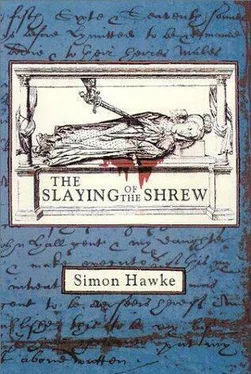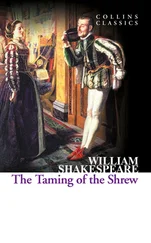Simon Hawke - The Slaying Of The Shrew
Здесь есть возможность читать онлайн «Simon Hawke - The Slaying Of The Shrew» весь текст электронной книги совершенно бесплатно (целиком полную версию без сокращений). В некоторых случаях можно слушать аудио, скачать через торрент в формате fb2 и присутствует краткое содержание. Жанр: Исторический детектив, на английском языке. Описание произведения, (предисловие) а так же отзывы посетителей доступны на портале библиотеки ЛибКат.
- Название:The Slaying Of The Shrew
- Автор:
- Жанр:
- Год:неизвестен
- ISBN:нет данных
- Рейтинг книги:5 / 5. Голосов: 1
-
Избранное:Добавить в избранное
- Отзывы:
-
Ваша оценка:
- 100
- 1
- 2
- 3
- 4
- 5
The Slaying Of The Shrew: краткое содержание, описание и аннотация
Предлагаем к чтению аннотацию, описание, краткое содержание или предисловие (зависит от того, что написал сам автор книги «The Slaying Of The Shrew»). Если вы не нашли необходимую информацию о книге — напишите в комментариях, мы постараемся отыскать её.
The Slaying Of The Shrew — читать онлайн бесплатно полную книгу (весь текст) целиком
Ниже представлен текст книги, разбитый по страницам. Система сохранения места последней прочитанной страницы, позволяет с удобством читать онлайн бесплатно книгу «The Slaying Of The Shrew», без необходимости каждый раз заново искать на чём Вы остановились. Поставьте закладку, и сможете в любой момент перейти на страницу, на которой закончили чтение.
Интервал:
Закладка:
“So then they are not imposters, either,” Shakespeare said. He frowned. “Well, that brings us down to Braithwaite and the Frenchman. Everyone else seems to have been accounted for.”
“And we have already agreed that ‘tis quite unlikely for the imposter to be Dubois,” said Smythe.
Shakespeare sighed. “I know. It just seems hard to credit,” he said. “Braithwaite truly seemed like a good fellow.”
“Perhaps he is, for all we know,” said Worley, “for as it happens, I have been unable to establish anything about our friend Dubois. No one at court seems to know a thing about him… or his self-effacing, silent father. I have arranged for the heralds to investigate his claims, but then that will take some time, I fear.”
“What of Andrew Braithwaite?” Smythe asked.
“I have had no luck there, either,” Worley replied. “I have men investigating his claims, as well, but I was unable to immediately confirm his identity with anyone at court. A number of people said they might recall his father, but that was hardly reliable evidence and no one could give any stronger testimony. Once again, it will take some time to establish whether or not he is an imposter.”
“Time is a commodity we may only have in short supply,” said Smythe.
“Not necessarily,” Worley replied. “Consider what has already been accomplished. We know that we are seeking two men, one of whom seems to be the principal motivating force behind this deviltry, whilst the other works as his confederate. Both may already be upon the scene as imposters, or else one is here amongst us openly whilst the other waits somewhere nearby, perhaps among the merchants at the fair, held in reserve. We have already managed to eliminate most of the guests from consideration as suspects. We appear to be down to only two.”
“Only the fair is drawing to a close,” said Shakespeare.
“True, but ‘tis no cause for alarm,” said Worley. “Remember that in order for the plot to succeed, the prize must be secured. And the prize, in this instance, is Blanche Middleton. More specifically, her dowry. And once that prize is secured, Blanche then becomes disposable.”
“Goodness!” said Elizabeth, shivering involuntarily.
“Forgive me, milady,” Worley said, “but the truth of the matter is that we are dealing with desperate and evil men, or at the very least, with one man who is the evil genius of this plot and another who merely allows himself to be led. Either way, the sort of character who would hatch a devilish plot like this is not a man who would be squeamish or would frighten easily. He knows that you, Tuck, have overheard something of his plan, but he cannot know for certain how much you may have overheard. Thus, methinks that he will likely be disposed to gamble.”
“How so, milord?” asked Smythe.
“Well, it takes an old corsair to know how another pirate thinks,” said Worley. “And whilst our man may be a landlubber, he is nevertheless quite the buccaneer in the way he sails straight into danger with every inch of canvas up. He knows that at least in part, his plan has been exposed, and yet he also knows that if his true identity were known, he would have been in chains by now. Since he is not, he has made the logical assumption that his masquerade still remains intact. We do not know who he is. Therefore, he perseveres. There is still considerable risk involved, but then he knew that from the very start. The risk has now increased, of course, but to such a man, ‘twould only add spice to the adventure.”
“As with one who plays at dice or cards, the thrill is in the risk,” said Shakespeare.
“Verily,” Worley said, nodding in agreement. “And our man knows that the greatest risk to him at present is our friend, Tuck, here. He is the one who overheard the plot, or at the very least a part of it, and thus he is the one who may yet recognize one or both of the voices he had heard. Thus, Tuck is the obvious risk to be eliminated.”
“And our man has tried that twice already,” Smythe said, grimly.
“Doubtless, he shall try again,” Worley replied. “You may depend on it, so watch your back. However, here is what our quarry does not know. He does not know about me. He assumes that because the queen has left the city with her court, that anyone of consequence among the nobility will be traveling with her, as indeed, most of them are. He has also assumed that because Middleton is not, himself, a peer or a prominent fixture in court society, though he has ambitions in that regard, that the guests at his daughter’s wedding celebration will not be among the upper crust, but rather the topmost layer beneath it, if you will. In other words, primarily the wealthy new men of the middle class and, perhaps, a few rather minor members of the nobility. He knows that there is still a chance his masquerade might be exposed, but the risk of that is not so great as ‘twould have been were any courtiers present, for they have little else to do but keep track of one another and their respective standing in the pecking order. Thus, our man puts on a bold face and proceeds as planned. But he does not know that I am here, or that I have been alerted to his villainy and have already made inquiries which have enabled us to narrow down our list of suspects to just two. As a result, the degree of risk for him has now become quite high… only he does not yet know that.”
“But he shall surely know it as soon as he becomes aware of your presence here, milord,” Elizabeth said.
“Which is precisely why he shall not become aware of it,” said Worley. “Save for the three of you, no one else knows I have returned. Therefore, let us keep it that way. Do not mention my return to anyone, and if anyone should ask, feign ignorance.”
“But… where shall you be, milord?” Elizabeth asked. “Even if you intend to conceal yourself in the upstairs rooms, the servants will become aware of you and they will surely spread the word.”
Worley smiled. “Never fear. Not even Godfrey Middleton will know I have returned. I have already made preparations in anticipation of this.”
“But… where will you be, milord?” asked Shakespeare.
“Hiding in plain sight,” said Worley, with a smile. But before he could continue, a sharp cry echoed suddenly across the grounds.
“Goodness! What was that?” Elizabeth said, clutching at Smythe instinctively.
“I think it came from over there,” said Shakespeare, pointing. “The maze!” said Worley. He started running towards the entrance.
“ Elizabeth, get back to the house,” said Smythe. “No, I am going with you.” “ Elizabeth, for God’s sake!”
“I feel much safer with you,” she insisted. “Do not bother to argue, for I am not going back!”
“What if I go back?” said Shakespeare.
“Oh, Hell’s bells! Come on, both of you! We must catch up with Sir William!”
Smythe quickly realized that was more easily said than done, for Sir William’s long legs had given him a considerable head start and he was running very quickly. If Smythe had not known about his secret life as the outlaw, Black Billy, he might have been surprised at how fit Sir William was for a supposedly indolent aristocrat, but he knew that Worley was in truth anything but that. By the time they reached the entrance to the maze, Sir William had already gone inside.
Their eyes were well accustomed to the night by now, but it was nearly pitch dark inside the maze. Smythe still had his sword, and he now drew it, holding it before him as they proceeded, for although it was difficult to see, what they heard gave them due cause for caution.
Somewhere within the labyrinthine hedges of the maze, a furious fight was taking place. They could hear the rapid clanging of blades ringing out in the darkness somewhere nearby, and judging by the sounds of the combat, it was in deadly earnest. Smythe knew enough of swordsmanship to tell, just by the sounds of blade on blade, that the men engaged were both skilled swordsmen.
Читать дальшеИнтервал:
Закладка:
Похожие книги на «The Slaying Of The Shrew»
Представляем Вашему вниманию похожие книги на «The Slaying Of The Shrew» списком для выбора. Мы отобрали схожую по названию и смыслу литературу в надежде предоставить читателям больше вариантов отыскать новые, интересные, ещё непрочитанные произведения.
Обсуждение, отзывы о книге «The Slaying Of The Shrew» и просто собственные мнения читателей. Оставьте ваши комментарии, напишите, что Вы думаете о произведении, его смысле или главных героях. Укажите что конкретно понравилось, а что нет, и почему Вы так считаете.












